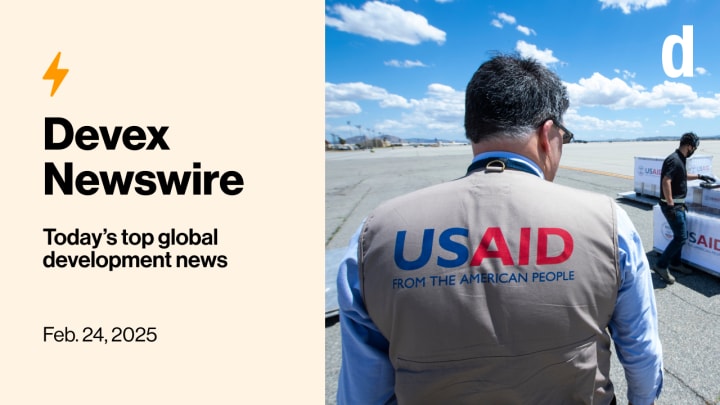
Thousands of USAID employees hoping to avoid administrative leave or being recalled from their overseas posts had their hopes dashed Friday. Shortly afterward, the firings began.
This is a preview of Newswire
Sign up to this newsletter for an inside look at the biggest stories in global development, in your inbox daily.
Also in today’s edition: Three years ago today, Russia invaded Ukraine, setting off Europe’s deadliest land war since World War II — a war U.S. President Donald Trump wants to end, not with more money but with political might. But did his predecessor come up with a clever workaround to channel some aid dollars into Ukraine?
+ Join us today for a session on what to do if you’ve lost your NGO job. If you can’t attend live, register anyway and we’ll send you a recording.
Unpause
That didn’t take long. After a court order Friday paved the way for thousands of USAID staffers to be placed on administrative leave (more on that below), employees received a notice Sunday alerting them that not only will most USAID direct hires worldwide be placed on leave, but that 1,600 personnel in the U.S. will be fired — or, in government speak, subject to a “reduction-in-force.”
“As of 11:59 p.m. EST on Sunday, February 23, all USAID direct hire personnel, with the exception of designation personnel responsible for mission-critical functions, core leadership and/or specially designated programs, will be placed on administrative leave globally,” the notice stated.
It isn’t clear which staff at USAID will be affected by the 1,600 firings, my colleague Elissa Miolene reports.
“Is this civil service? Foreign service? All?” asks one USAID staffer. “No clarity.”
“There’s more order and yet they still are producing chaos,” the staffer says. “We keep getting these big, scary emails on weekends. There’s no day free of the scare tactics and mental torture.”
Over the weekend, staff members started to receive letters indicating their employment was terminated. My colleague Sara Jerving obtained copies of termination notices — including to someone stationed abroad — in which Peter Marocco, USAID’s acting deputy administrator, said they were “being released” from their “competitive level” because that “competitive area is being eliminated.”
USAID employees also received more details over the weekend about the State Department team tasked with recalling staff members abroad. One USAID employee abroad tells Sara that while this new coordination team may be able to handle simple logistics, it doesn’t have a clear mandate for families with complicated situations.
Sara was informed of one case where USAID’s finance team called a staff member's child’s school abroad to inquire about refunding the tuition already paid — for a child with special needs.
“It’s inhumane and humiliating,” the USAID employee abroad tells Sara.
Read: USAID to cut 1,600 staff, place nearly all direct hires on leave
Read more: USAID staff start receiving termination letters
Court gesture
Judge Carl Nichols, a Trump appointee, initially put a temporary block on the administration’s plan to put thousands of USAID employees on administrative leave and recall most staff stationed overseas. However, on Friday, he found that “the risk posed to USAID employees who are placed on administrative leave while stationed abroad — if there is any — is far more minimal than it initially appeared.”
Nichols seemed satisfied with reassurances made by Marocco that the agency “will maintain adequate communications and systems to ensure [employees’] safe return,” with the judge stating that the prospect of staff suffering physical harm while on administrative leave abroad was “highly unlikely.”
Crucially, he stated that staff members’ “archetypal complaints” were largely financial and could be redressed under existing mechanisms to resolve employee disputes with the federal government.
As to the larger question of the administration’s 90-day pause on foreign aid spending, the judge dismissed the plaintiffs’ concern that it would result in “harsh consequences,” both at home and abroad. He cited the administration’s argument that harm could ensue if its actions are not permitted because it argues the foreign aid industry is “not aligned with American interests and in many causes antithetical to American values.”
“Weighing plaintiffs’ assertions on these questions against the government’s is like comparing apples to oranges,” the judge wrote. “Where one side claims that USAID’s operations are essential to human flourishing and the other side claims they are presently at odds with it, it simply is not possible for the Court to conclude.”
So where does that leave USAID employees? Pretty much back where they started: Staff will be required to decide within 30 days whether they want to return to the U.S. or remain at their overseas posts. If employees choose to stay, they will be entitled to “all of the benefits previously available” as long as the employee remains on administrative leave, the ruling states.
After 30 days, staff will lose their travel compensation unless they receive an “individualized exception” for pregnancy, medical needs, children’s school schedules, or “other reasons.”
Read: Court says thousands of USAID staff can be put on leave, recalled
From Russia, probably not with love
If it wasn’t clear on the campaign trail, it’s crystal clear now: Trump ain’t giving Ukraine a dime any time soon, if ever. As he sides with Russian President Vladimir Putin and calls Ukrainian President Volodymyr Zelenskyy a “dictator,” Trump has loudly telegraphed that the spigot of U.S. assistance is closed.
Anticipating that potential cutoff, the Biden administration tried to Trump-proof billions in assistance to Ukraine via a newly created World Bank fund. Former U.S. President Joe Biden put $20 billion in U.S. contributions into the fund as part of a plan among the world’s biggest economies to use the interest from Russia’s frozen assets to provide $50 billion in loans for Ukraine, Jen Kirby writes for Devex.
“Frankly, what we came up with is something that wasn't that novel. It's what lots of rich people in the United States do every day,” a former Biden official said.
After disbursing $16 billion weeks before Trump took over Washington, D.C., about $4 billion in U.S. money remains in the fund, yet to be allocated — a decision that the next Trump administration can influence, but likely cannot fully block. As the senior Biden Treasury official stated: “We wanted to give some certainty that some of the money would be in the hands of the Ukrainians.”
Read: How the US helped protect a $20B promise to Ukraine ahead of Trump (Pro)
EU better work
With Trump’s voice currently the loudest on Ukraine, the EU will need to speak up and chip in if it wants to have a seat at the negotiating table. That means not just security guarantees, but development assistance, argues Julian Bergmann of the German Institute of Development and Sustainability in an opinion piece for Devex.
“As the Heritage Foundation’s Project 2025 report indicates, the U.S. administration will likely leave it completely to Europeans ‘to address Ukraine’s economic needs,’” he writes. “The EU needs to prepare for such a scenario.”
Opinion: Amid US fallout, time for the EU to step up assistance to Ukraine
All roads lead to Rome
Let’s shift gears from Washington and Kyiv to Rome, where a major conference on nature loss isn’t grabbing international headlines — but is highly consequential to the global south and the planet for that matter.
Delegates from the U.N. Biodiversity Conference, aka COP16, are meeting tomorrow in the eternal city to tie up the loose ends from the last gathering in Cali, Colombia.
Many of the disagreements that bedevil all COP negotiations are sure to rear their head again: unfulfilled financial promises; the push from developing countries to get their wealthier counterparts to pay up; the reluctance of wealthier countries to do so; talks on the toughest topics saved to the last possible minute, etc.
Still, there’s a positive vibe at this COP, writes my colleague Jesse Chase-Lubitz, who has a cheat sheet on what to expect. While the three days in Rome this week won’t have the same pomp and circumstance as Colombia, that means the discussions will be far more concentrated on the meaty stuff right away.
“I think we're all feeling fairly optimistic that we'll be able to come together and set out a road map for how the post-2030 resource mobilization architecture will look and so I'm feeling pretty hopeful,” says Linda Krueger of The Nature Conservancy.
Read: At COP16 take two, delegates aim to finalize funding for biodiversity (Pro)
+ Not yet a Devex Pro member? Start your 15-day free trial today to access all our expert analyses, insider insights, funding data, exclusive events, and more. Check out all the exclusive content available to you.
In other news
A new polio vaccination campaign began in Gaza Saturday, aiming to immunize 600,000 children after the virus was found in wastewater. [UN News]
Bangladesh’s interim leader Muhammad Yunus invited Elon Musk to visit and launch Starlink satellite internet service in the country. [Bloomberg]
China will deepen its rural reforms to boost agriculture and food security amid U.S. tariffs, economic slowdown, and climate change, state media reported. [Nikkei Asia]
Sign up to Newswire for an inside look at the biggest stories in global development.




